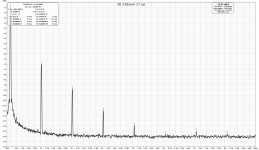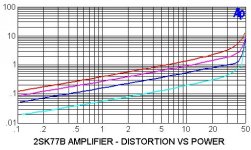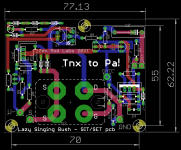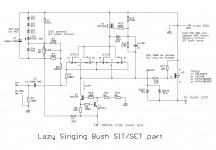While building my Singing Bush, I soldered some heavy duty pin sockets on two of the five mu resistor spots on the top and bottom. I really didn't intend to deviate from the papa approved .2 up and .2 down, but also know that I can never leave well enough alone. I was really loving the the sound, but was missing some of the clarity I get from the Sony SE VFET amp.
So, I started with a minor adjustment – taking .03R from the top and adding it to the bottom for a cumulative edit to .23 down and .17 up. WOWSA! I was not expecting such a dramatic change! Just that small tweak lowered my THD from .17% to .11% and gave me just the right amount of airiness and clarity I was missing. Since then I've moved the output tap up and down more liberally (never outside of the parameters Nelson suggested), but I ultimately come back to that first, small tweak.
Looking at the graphic Nelson showed during his BAF talk, the THD reduction shouldn't have been a surprise. I just wasn't expecting such a positive improvement in sound. I'm a happy camper 😀
So, I started with a minor adjustment – taking .03R from the top and adding it to the bottom for a cumulative edit to .23 down and .17 up. WOWSA! I was not expecting such a dramatic change! Just that small tweak lowered my THD from .17% to .11% and gave me just the right amount of airiness and clarity I was missing. Since then I've moved the output tap up and down more liberally (never outside of the parameters Nelson suggested), but I ultimately come back to that first, small tweak.
Looking at the graphic Nelson showed during his BAF talk, the THD reduction shouldn't have been a surprise. I just wasn't expecting such a positive improvement in sound. I'm a happy camper 😀
Attachments
those exact SIT pucks shown on pic(s) of BAF Article , judging by Ser. No (and somehow being logical that Pa made test with same ones) - are in my posession 
wowza! my SITs are Famous!!!!!!!!!


wowza! my SITs are Famous!!!!!!!!!

I noticed that too! The pic in his pres matches the serial of the pic in your datasheet blog post.
ZM owns the needle found in the stack of needles, which were recovered from a larger stack of needles. 😀
ZM owns the needle found in the stack of needles, which were recovered from a larger stack of needles. 😀
Last edited:
what can I say ....... ZM being cunning, hanging with Right Singing Bush
besides, I'm so Omniadorable and Omnilikeable

besides, I'm so Omniadorable and Omnilikeable

codyt, proponent of Lazy Singing Bush
why you didn't had yor brain turned On, when you well aware that I'm rarely having mine in that state?
now - I got pcbs for Lazy Singing Bush; have some work to do prior , and I'm sure that LSB will be tried/tested in some random organized moment
anyway - what piece of logic moment was missing - SIT pcb arrangement :
logic is - no need for 2SK77B footprint on pcb (who is going to be nutz enough to waste 2SK77B in follower role?) ...... but I did it anyway that way, simply because I was editing already existing Singing Bush SIT pcb ....
twisted logic
proper logic : since there is no possible way of implementing THF51/2SK182 on pcb itself, wht not putting IXYS puck on pcb, so enabling either SIT with wires to pcb ( energy wires anyway directly bolted to SIT itself) or IXYS Nchannel puck connected in Kosher way ( straight MOS) or even More Kosher way ( as Schade connected MOS)
silly ZM
anyway ........ that option made as file, if everything** goes as predicted/wanted, will order new pcbs
**SIT , straight MOS, Kosher MOS
why you didn't had yor brain turned On, when you well aware that I'm rarely having mine in that state?
now - I got pcbs for Lazy Singing Bush; have some work to do prior , and I'm sure that LSB will be tried/tested in some random organized moment
anyway - what piece of logic moment was missing - SIT pcb arrangement :
logic is - no need for 2SK77B footprint on pcb (who is going to be nutz enough to waste 2SK77B in follower role?) ...... but I did it anyway that way, simply because I was editing already existing Singing Bush SIT pcb ....
twisted logic

proper logic : since there is no possible way of implementing THF51/2SK182 on pcb itself, wht not putting IXYS puck on pcb, so enabling either SIT with wires to pcb ( energy wires anyway directly bolted to SIT itself) or IXYS Nchannel puck connected in Kosher way ( straight MOS) or even More Kosher way ( as Schade connected MOS)
silly ZM
anyway ........ that option made as file, if everything** goes as predicted/wanted, will order new pcbs
**SIT , straight MOS, Kosher MOS
Attachments
who is going to be nutz enough to waste 2SK77B in follower role?
 This guy....
This guy....Well, I at least want to try it. No doubt wasteful though, and I've got THF in the drawer for a more permanent implementation.
But yes, this _is_ the right logic, no doubt about that. I like it. Just save at least one of those 77B footprint PCBs for your nutty yank pal, codyt 😀
For anyone holding Tokins and feeling sad cuz you missed out on Sony DIY lottery, this is the amp for you 🙂
This guy....
Well, I at least want to try it. No doubt wasteful though, and I've got THF in the drawer for a more permanent implementation.
But yes, this _is_ the right logic, no doubt about that. I like it. Just save at least one of those 77B footprint PCBs for your nutty yank pal, codyt 😀
I'm curious... you think there'd be audible differences between 77B and the other Tokins in the same topology? I mean, I know it'd just be cool to have the OG vfets in there from a psychological perspective. 🙂
I think so, just based on the lesser thd of the 77B parts. But honestly, I don’t know. I imagine you’d end up with an amp with less thd, but not necessarily one that sounds better.
I think so, just based on the lesser thd of the 77B parts. But honestly, I don’t know. I imagine you’d end up with an amp with less thd, but not necessarily one that sounds better.
Doh -- I mixed up the 77B with the old Yamaha VFETs. I guess those were 2SK77(non-B)? The 77B appears to be a more modern SIT? They look to be even more rare than the other SITs -- lucky you 🙂
That's a great point about the THD spectrum being different.
Yeah, I think the 77B was an attempt to make a modern version of the old 77’s. They are amazing parts for sure, and I’m super lucky to have a pair.
successful attempt, as far as I know
though, it's easy to end with proper amp using proper devices
it's much more interesting using elevator parts

though, it's easy to end with proper amp using proper devices
it's much more interesting using elevator parts

successful attempt, as far as I know
though, it's easy to end with proper amp using proper devices
it's much more interesting using elevator parts


Truth. Audiophiles be saying: "The sound has some weight to it... industrial even. 🙂
Actually, what were these Tokins mainly used for? Military?
- Home
- Amplifiers
- Pass Labs
- The Singing Bush Tips 'n' Tricks







